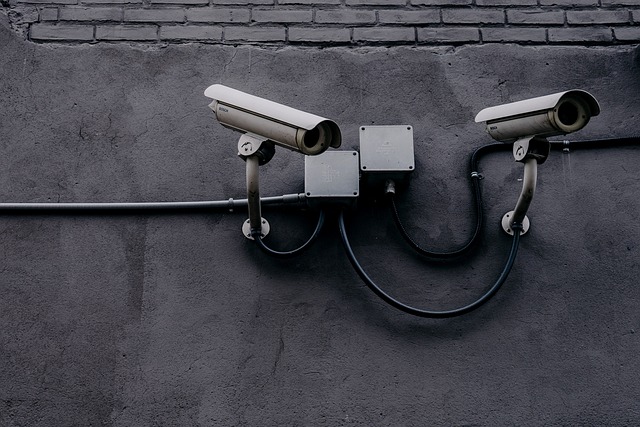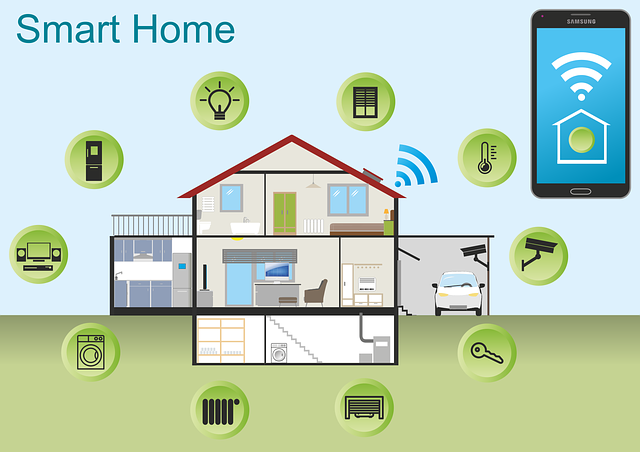AI in home security has transformed traditional systems into intelligent, proactive protectors. Modern security technology leverages AI for enhanced protection through face/voice recognition, predictive analytics, and real-time alerts. AI-driven systems analyze patterns, detect anomalies, and anticipate threats, enabling quicker responses to emergencies. While offering unprecedented vigilance, these advancements raise ethical concerns regarding privacy and data security. The future holds a prominent role for AI in safety, with innovative solutions like precise intrusion detection and smart cameras, promising enhanced protection tailored to individual needs.
In today’s digital era, understanding the impact of artificial intelligence (AI) on home security is more crucial than ever. The evolution from traditional to modern security systems has been transformative, with smart technology leveraging AI to enhance vigilance and peace of mind. This article explores AI’s multifaceted role in home protection, delving into its capabilities, benefits, and challenges. From increased surveillance to data privacy concerns, we navigate the complexities of AI advancements in security, highlighting their potential to shape a safer living environment.
- The Evolution of Home Security: From Traditional to Modern Systems
- Exploring Artificial Intelligence: Defining AI and its Capabilities
- AI in Action: Enhancing Home Safety with Smart Technology
- Benefits of AI-Driven Home Protection: Increased Vigilance and Peace of Mind
- Challenges and Ethical Considerations: Ensuring Privacy and Data Security
- The Future of Home Security: AI's Role in Shaping a Safer Living Environment
The Evolution of Home Security: From Traditional to Modern Systems

Home security has undergone a remarkable transformation over the years, evolving from traditional mechanical locks and alarm systems to modern, sophisticated technology. The introduction of AI in home security marks a significant milestone in this evolution, revolutionizing how we protect our living spaces. Artificial intelligence security solutions offer advanced capabilities, such as smart home integration, face or voice recognition, and predictive analytics, enhancing overall safety.
Modern security technology leverages AI-driven home protection to detect unusual activities, monitor entry points, and provide real-time alerts. These advancements enable homeowners to stay one step ahead of potential threats, ensuring their peace of mind. With AI security advancements, the role of AI in safety becomes increasingly critical, promising a future where homes are not just protected but actively safeguarded through intelligent, proactive measures.
Exploring Artificial Intelligence: Defining AI and its Capabilities

Artificial Intelligence (AI) is transforming various aspects of our lives, and home security is no exception. With its ability to learn, adapt, and process vast amounts of data, AI offers unprecedented potential for enhancing residential safety. Modern security technology powered by AI can analyse patterns, detect anomalies, and predict potential threats, providing an extra layer of protection for homeowners.
AI-driven home protection systems use advanced algorithms to interpret sensor data from cameras, motion detectors, and smart locks. These intelligent systems can recognise familiar faces, track unusual movements, and alert residents or authorities in real time. AI security advancements also include voice assistants that double as security monitors, capable of verifying identities, detecting intruders, and responding to emergency situations through automated protocols. The role of AI in safety is evolving rapidly, promising a future where homes are not just protected but proactively secured by intelligent technology.
AI in Action: Enhancing Home Safety with Smart Technology

The integration of AI in home security systems is transforming how we protect our personal spaces. Smart technology powered by artificial intelligence offers enhanced capabilities, enabling devices to learn patterns and behaviors, detect anomalies, and respond autonomously. This advanced surveillance goes beyond basic motion sensors; it involves facial recognition, voice commands, and predictive analytics to anticipate potential threats. With AI-driven home protection, modern security technology becomes a proactive force, ensuring not just detection but also precise identification and swift action.
AI security advancements play a pivotal role in raising the bar for residential safety. These innovations allow for seamless integration of multiple devices, creating an interconnected network that provides comprehensive monitoring. From smart cameras that can differentiate between familiar faces and intruders to voice assistants that alert authorities upon suspicious activity, AI-powered systems offer around-the-clock vigilance. As these technologies continue to evolve, they promise a future where home security becomes more intelligent, efficient, and adaptable to the unique needs of each residence.
Benefits of AI-Driven Home Protection: Increased Vigilance and Peace of Mind

AI-driven home protection systems are revolutionizing modern security technology, offering unprecedented levels of vigilance and peace of mind for homeowners. Artificial intelligence can analyze vast amounts of data in real time, detecting patterns that might indicate potential threats. This advanced capability allows AI to identify suspicious activities much faster than traditional security systems, enabling quicker responses to intrusions or other emergencies.
By leveraging AI security advancements, modern home protection goes beyond simple motion detection and alarm triggers. These intelligent systems can learn the habits and routines of residents, automatically adjusting settings based on individual preferences. This not only enhances convenience but also reinforces a robust security posture, as the system becomes increasingly attuned to normal behavior patterns, better able to distinguish between genuine threats and false alarms.
Challenges and Ethical Considerations: Ensuring Privacy and Data Security

As AI continues to permeate various aspects of our lives, including home security, it brings about both significant benefits and unique challenges. The integration of artificial intelligence (AI) in home security systems promises enhanced protection through advanced monitoring and predictive analytics. Modern security technology powered by AI can detect anomalies, anticipate potential threats, and enable proactive responses, revolutionizing the way we safeguard our homes. For instance, AI-driven cameras with facial recognition capabilities can identify familiar faces and alert owners of any unfamiliar visitors, while voice assistants can automate and secure various home functions.
However, these advancements also raise important ethical considerations regarding privacy and data security. With AI systems collecting vast amounts of personal data from smart home devices, ensuring the protection and secure storage of this information becomes paramount. Users must be informed about data collection practices, given the potential risks associated with breaches or unauthorized access. Moreover, transparency in how AI algorithms make decisions is crucial to maintaining trust, especially when these systems influence security protocols and personal safety measures. Striking a balance between leveraging AI’s capabilities for enhanced home security and upholding robust privacy and data protection standards remains an ongoing challenge as this technology evolves.
The Future of Home Security: AI's Role in Shaping a Safer Living Environment

The future of home security is evolving rapidly with artificial intelligence (AI) at its forefront, promising to revolutionize how we protect our living spaces. AI in home security isn’t just a futuristic concept; it’s an emerging reality that leverages advanced algorithms and machine learning capabilities to enhance modern security technology. By analyzing patterns and detecting anomalies, AI-driven systems can provide proactive protection against potential threats, ensuring a safer living environment for homeowners.
AI security advancements are reshaping the way we approach home protection. These innovations enable more accurate intrusion detection, facial recognition for access control, and smart cameras that can differentiate between people, pets, and potential intruders. The integration of AI in these areas not only improves response times but also reduces false alarms, allowing homeowners to have peace of mind knowing their properties are being monitored by intelligent systems. As AI continues to develop, its role in safety is set to become increasingly prominent, offering new levels of protection and convenience for modern households.






